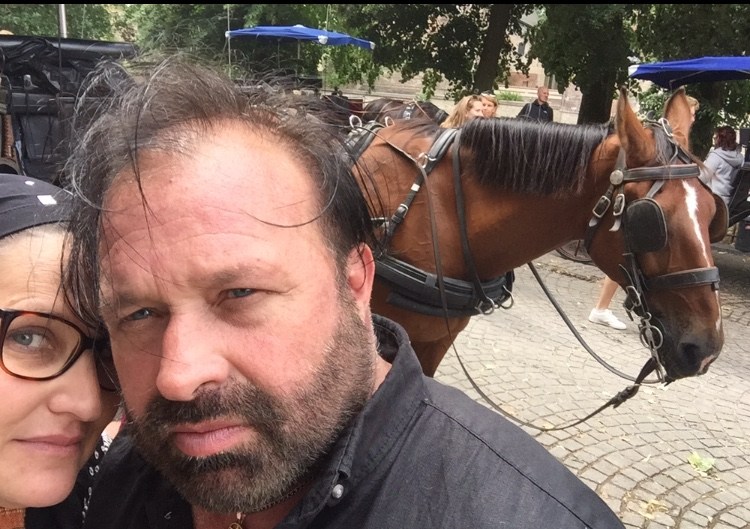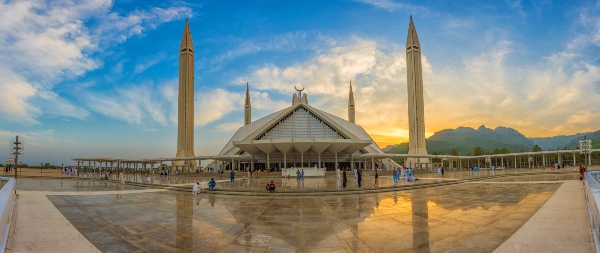Christian is a Philosopher that comes from Belgium. What identifies him the most and above all is simplicity, for everything is better with “vanilla ice cream.” Perhaps, for this reason, his intellectual passion is criticism and irony, in the sense of trying to reveal what “hides behind the mask,” and give birth to the true. For him, ignorance and knowledge never “cross paths.” What he likes the most in his leisure time, is to go for a walk with his wife.

Scott Douglas Jacobsen: Freethinkers, as a general term, continue to endure explicit discrimination in law and in fact, in cases, to the present day. Some of the prominent cases include the prominent Pakistani Gulalai Ismail and the Nigerian Mubarak Bala.
Ismail is the Co-Founder of Aware Girls (w/ Saba Ismail) and on the Board of Humanists International. She was known for outstanding human rights work, receiving awards and recognition, and then, shortly thereafter, charged on various ‘counts’ and having to flee Pakistan as one of the most wanted people in the country.
It came to the point of The New York Times reporting on the issues facing her, her story, in two articles entitled “Gulalai Ismail, Feminist Hunted by Pakistan’s Authorities, Escapes to U.S.” and “In Pakistan, a Feminist Hero Is Under Fire and on the Run.”
Bala is the President of the Humanist Association of Nigeria. In April of 2020, he was arrested in Kaduna for ‘blasphemy’ on social media, i.e., a single Facebook post. He was taken from Kaduna to Kano. The Penal Code of Kano is Sharia-based law.
Indeed, this becomes a means by which to persecute him, an atheist and ex-Muslim, under Islamic law, which should not apply to someone who does not believe in the theology or the theocratic law anymore.
Zara Kay, the Founder of Faithless Hijabi, is another case as of recent. This time, with Tanzanian background, taken by police under apparent illegitimate circumstances too. Similarly, on a less reported case, ‘Ayaz Nizami,’ the Vice President of Atheist & Agnostic Alliance Pakistan, was taken and charged with blasphemy.
‘Nizami’ was arrested on March 24, 2017, based on purported blasphemy. He has been facing death penalty charges. With the arrest, illegitimate in personal opinion, because blasphemy is a religious law and not a secular law for all (so something the religious may charge against the non-religious unequally to the extent of death penalty application following from it, possibly); it repeats the situation.
In each case, a co-founder of a women’s and girls’ rights organization (Ismail), the president of a national humanist association (Bala), the founder of an ex-Muslim organization (Kay), and the vice president of an atheist and agnostic national organization (‘Nizami’). Each seems to be illegitimate, in personal opinion, and based on targeted attacks on prominent secular individuals in each nation.
There are a lot of other cases. Likewise, there are a lot of other cases with nearly zero coverage or simply null coverage – the non-consenting Houdini acts or forced disappearances. No joke about the trauma and mental health effects on those individuals disappeared – let alone reputational damage.
According to the United States Commission on International Religious Freedom, 71 of the 195 countries in the world have blasphemy laws of some form or another. There are around 13 countries with the death penalty for open atheists, as least as of 2013. What do you make of the consistent trends in these cases?
Dr. Christian Sorensen: I think that just as there are countries, that have blasphemy laws, because in practice generally follow what for me, is a kind of pantheism without explicitly recognizing it, since everything that’s touched, they believe that it has a divine breath, although actually, it may be something of secular matter, and therefore, absolutely devoid of any religious nature, they’re others as counterpart, who tend to recognize themselves, as liberal and democratic, since explicitly, this countries do not have blasphemy laws, although in general, they act like religious pantheists, and consequently in practice, they implicitly live, according to blasphemy laws. Therefore it could be said, that in their own way, they make freethinkers suffer, social death sentences, without giving them any chance to escape, and consequently by exerting progressive stress, through emotional saturation, they end up transforming them into living dead.
Jacobsen: What would equalize the landscape in a positive way?
Sorensen: I think that one way to achieve a positive balance, would be to create facilitating conditions, that could allow an openness to change, by basing their search towards common denominators, that are able to position the foundations, of what for me, would be the feeling of a sufficient basic confidence, in order to carry out from early education, and regarding the value system, the recurring of critical reviews, as an aim resource, for introducing in a non-threatening context, the input of necessary adjustments, as temporarily relative outcomes.
Jacobsen: What might bring about some justice for these aforementioned individuals?
Sorensen: I think that the international community of human rights, should intervene officially, which means, that their pertinent organizations, must imperatively demand, by applying sanctions, that these theocratic countries, fulfill the commitments acquired, in front of human rights treaties, to which they have become in some way parties, and in its defect, because without exception, this nations integrate said international organizations, which means, that they have to respect their involved principles and missions. Certainly what I suggest above, is just a theoretical duty, since the notes of its score, is usually subjected, to over-justified political and economic explanations, that obviously as it’s logical to suppose, they’re firstly interfered and afterwards distorted, for becoming utopian ideals, which poorly serve, for nominalistically safeguard their motivations for existing, and for preserving, what in my opinion, is the mere homeostasis of mediocrity, to the extent that these organizations, use to maintain a sort of absurd and romantic duality, between what represents their declaration of principles, as promotional discourse of human rights, and their praxis, as nirvanal world of good intentions, which in itself regarding the last, almost never forges in a concrete good will, since are incapable of reaching not even with the first aid, the desperate cry for help, due to the fact, that deep down what prevails, is the irreflexive and spontaneous attitude, typical of acquiescence, that would invalidate any outcome, because in my opinion hides the being, with what I will denominate as the image of being with.
Jacobsen: What countries seem the most egregious in this form of theocratic encroachment into political life and law, or the State?
Sorensen: I think that basically, all the countries that are linked to the ideals of pan-Arabism.
Jacobsen: Why should there be more forceful pushback against these legal and political encroachments?
Sorensen: Because these usurpations, are contrary to reason, and therefore to commonwealth. In consequence, it is a driving force, that corrupts cultures and ends up destroying civilizations. This allows to deduce, in concrete terms, that from a legal and political point of view, this pattern of behaviors, are morally unacceptable, according to what the universal declaration of human rights, have expressed. The aforementioned means, that nobody without exception, can respectively be charged, regarding professed ideas, with condemnatory sanctions of any nature, since the simple act of thinking, is an inalienable right, and as long as does not promotes hatred or violence, and therefore constitutes a danger to society, never should be constricted. In consequence, it is a political and legal duty, the fact of creating sufficient conditions, in relation to respect and tolerance, in order that ideas can be freely manifest, regardless of the valence that the content of these may have.
Jacobsen: How do ordinary believers stand to benefit in more equal stature in law and in politics, and in rights, between non-believers and themselves?
Sorensen: I think that this is possible, to the extent, that tolerance prevails, as the guiding principle for coexistence in society, and in turn, that the aforementioned, is understood simultaneously and in accordance, with the fact regarding which, the dignity of individuals transcends that of ideas, due to the matter of aseity, since the last, not only cannot exist by themselves, but also to be able to do so, they absolutely need of the existence of the first ones.
Jacobsen: Why are attempts at equality, often, seen as a loss of rights for they who already have the rights, or as an attack on their religious status?
Some make religious or theological arguments about some cosmic or even metaphysical war waged since the start of time between the forces of Good and the forces of Evil, which is perceived or asserted by not-insignificant numbers of the global population.
So, it seems an important consideration in this regard because the social media postings and commentary, and written works make this point of view reasonably clear as sincerely held by many.
Sorensen: Actually, the resistance to accepting equality in front of rights, which means that those who hold a greater number of rights, for some reason, use diverse oppositionist and defensive mechanisms, in order to justify their inequity, and consequently, for not being disposed to yield some of them, in favor of a greater comonwealth, is not a particular phenomenon of theocratic countries and cultures, but rather it is a verifiable fact, that has always accompanied humanity. The aforementioned, indeed, does not necessarily implies, that this causal relationship between selfishness and human inequity, can be established with certainty, as something due, either to innate tendencies, or learned through socio-cultural patterns of conditioning. However, what can be affirmed necessarily, is that this causality, by going hand in hand with abuse, leads inevitably to injustice, and if vital experience of individuals, is crossed instead, more through educational bases on positive reinforcements, and on constructivists social values, than by punitive consequences invested with suffering, then intrinsic human egoism, logically, can be transformed into egalitarian altruism. I think, that if human beings, have constantly created dichotomous theologies, based on good and evil, what in essence they have been done, is nothing else than projecting the internal dualism, that regards the good self and bad self, felt within themselves, without fully understanding, despite of what have represented the repeated failures of history, that duality as such, does not exist in any order of things, since rather what exists, and is able to be verified, through the evidence of simple experience, is the presence of polarities, which in their dynamis, they unfold continuously and not discreetly, by offering a nuanced universe, with an infinity of predestined points, therefore not appearing by chance in space, and with the possibility of forming mathematical integrals, which consequently may open, evolutionary channels of limitless realities.
Jacobsen: What countries seem to be doing the best in bringing forward equality for the non-religious and the religious in law, in politics, and in rights?
Sorensen: According to a positive antithesis, of what the theocratic states of the Muslim countries, and the theocratic Catholic state of the Vatican could represent, which regarding the last, includes all those countries, that professing Catholicism as an official religion, and although they do not declare themselves, theocratic countries, they actually behave as such, since ultimately, they end up violating secular rights, with the same impunity, but perhaps not with the same cynicism, as Muslim countries do. I think, that the only religious country, that has managed to maintain, a democratically balance equality, between the rights of the secular and religious world, is the Jewish state of Israel, *because culturally speaking, in my opinion, conceives by two the discussion around ideas, but counts them, as if they were three.
Jacobsen: Thank you for the opportunity and your time, Dr. Sorensen.
Sorensen: You’re welcome, and I hope that this interview, contributes at least as a grain of sand, to stirring up the indolent and lethargic consciences of human rights organizations, for the promptly liberation alive of Ayaz Nizami.
Photo by Syed Bilal Javaid on Unsplash
Image Credit: Christian Sorensen.

